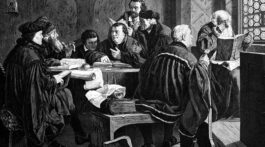Sabbath School Lesson for January 23-29, 2021
Lesson 5 Overview (Isaiah 9-12)
For daily videos about the lesson, see https://www.youtube.com/teresathompson
- Sunday: the Prince of Peace brings light to the region of Galilee (Isaiah 9:1-5)
- Monday: the Child has many names (Isaiah 9:6, 7)
- Tuesday: poor choices cause God to withdraw His protection (Isaiah 9:8-chapter 10)
- Wednesday: Jesse’s offspring (Christ) sets up a new kingdom of peace (Isaiah 11)
- Thursday: God comforts us and is praised (Isaiah 12)
Seldom has the world experienced peace. It’s been estimated that worldwide peace has only been felt about 8 percent of the time for all recorded history. War and strife have almost always been experienced somewhere on the planet. We long for Christ to set up His glorious Kingdom of peace, as described so eloquently in the passages studied in Isaiah this week.
Memory Text: “For unto us a Child is born, unto us a Son is given; and the government will be upon His shoulder. And His name will be called Wonderful, Counselor, Mighty God, Everlasting Father, Prince of Peace.” Isaiah 9:6 NKJV
As we explore each of these names of the Messiah, we will find that they express all of the glorious attributes of the Son of God. They bring to mind, not only His first coming as a Babe in Bethlehem, but also His magnificent Second Coming in the clouds of glory to take His children home. The plan of salvation will be complete, and it will be time to set up His Kingdom right here on the earth, a newly-cleansed and peaceful one.
Sunday: End of Gloom for Galilee (Isaiah 9:1-5)
A time of gloom and despair was felt in the land, when the occult brought mediums and spiritual darkness into the lives of so many of God’s people. In chapter 9, however, we find that “a great light” (Isaiah 9:2) would chase away that darkness.
Galilee was prophetically mentioned as receiving a large portion of this “light”. That region was especially blessed as Jesus began His ministry there. Many responded to His message of hope that would dispel the darkness that had so long enveloped their land.
Jesus became popular in Galilee by healing those with many physical ailments, but also those who were demon-possessed (Matthew 4:24, 25). Occult practices were prevalent there, and had led to some pitiful struggles with Satan’s demons by unfortunate victims, known as demoniacs.
These demoniacs often became a danger to others and caused much fear and suffering for those around them. They literally terrorized their communities. See Matthew 8:28. Jesus’ healing was the only way they and their neighbors would experience normalcy and peace in their lives again.
Bible Verses to Read and Discuss:
Isaiah 9:1-5 and Matthew 4:12-16
- How was this prophecy fulfilled in the life and ministry of Christ?
Monday: A Child for Us (Isaiah 9:6, 7)
The next two verses in Isaiah (verses 6 and 7) describe the Messiah in terms that have become familiar and loved by the whole world.
You may have noticed that royalty and even deities usually have long names. The longer the name, the more greatness of the person. The names given to this Child, this Son, truly indicate the features we need to know about Him.
- He is Wonderful. (He performs–is full of–many wonders, or miracles.)
- He is a Counselor. (He’s a wise advisor, who always knows what to do.)
- He is a Mighty God. (His mighty power makes Him our hero.)
- He is the Everlasting Father. (He is our forever God, having no end or beginning.)
- He is the Prince of Peace. (He desires peace in the world, not war.)
When these features of God’s character are known and appreciated, they dispel the darkness that clouds our heavenly vision of true peace.
Jesus Christ fulfilled all the qualifications of this Child. He came to show us what our Father is really like. Satan’s accusations about God being a harsh taskmaster–a vindictive, angry god–were totally proven false, as Jesus made the supreme sacrifice for us on the cross.
Bible Verses to Read and Discuss:
Isaiah 9:6 and Matthew 28:18
- What other information do we have in the Gospels that indicate that Jesus fulfilled all the requirements to be the Messiah?
- What else do we know about Jesus that illustrate His divinity and purpose on earth?
Isaiah 9:7 and Daniel 2:44
- What is special about God’s Kingdom?
Tuesday: The Rod of God’s Anger (Isaiah 9:8 and 10)
God continued to point out the sins of His people and warn them of the consequences of their selfish choices. Their pride and arrogance (mentioned in Isaiah 9:9) which led to many injustices in the land, were pointed out by God. Widows and orphans must have been particularly vulnerable in their culture, as they were mentioned often as those who suffered abuse and neglect in their society.
God went so far as to say, “For everyone is a hypocrite and an evildoer” (Isaiah 9:17). Their misdeeds must have reached a boiling point, which led to the series of hardships they were beginning to experience. Each rejection of their God caused His protection to be withdrawn. It came in stages, but it was bound to happen, due to their stubborn refusal to come back into their covenantal relationship with God.
God mercifully warned them of the dire trials in their future. He painted their future pain and suffering without Him, in hopes that they might yet make better choices and prevent these things from happening.
Bible Verses to Read and Discuss:
Leviticus 26:14-16 and 2 Peter 3:9
- How did Jesus demonstrate that it wasn’t God’s intention to make them suffer?
- What really caused their difficulties?
Wednesday: Root and Branch in One (Isaiah 11)
Isaiah 11 contains a beautiful description of God’s Kingdom. “The wolf also shall dwell with the lamb” is one of its beloved expressions (Isaiah 11:6).
The main character of this chapter though is the Messiah, called “a Rod from the stem of Jesse” (Isaiah 11:1).
Jesse, the father of King David, was known to be an ancestor of Jesus of Nazareth. But Jesus was more than that. Jesse actually came from Adam, who came from God. So, we can say with confidence that Jesus was not only a descendant of Jesse. He was also Jesse and David’s ancestor.
Symbolically then, we can see why Jesus is called the Root (ancestor) and the Branch (offspring or descendant) of David in Revelation 22:16. (See also Zechariah 3:8 and 6:12, where He’s referred to as the Branch.)
We see in this prophecy a blending of Christ’s first and second comings. It also ended with another prediction concerning their present enemy, Assyria. These dual messages are not uncommon in God’s word. Some of the predictions that Jesus gave His disciples when they asked about Jerusalem and the end of the world (Matthew 24) were fulfilled in 70 A.D., when the Roman army attacked Jerusalem. But, of course, other signs in that chapter pertained to conditions in the last days.
Bible Verses to Read and Discuss:
Isaiah 11:1, 10 and Revelation 22:16
- How was Jesus both the Root and Branch (or Rod) of Jesse and David?
- What does this tell us about His divinity?
Isaiah 11:9, Habakkuk 2:14, and 1 Corinthians 13:9-12
- What do you think it means that the earth shall be filled with the knowledge of the Lord?
Thursday: “You Comforted Me” (Isaiah 12)
Chapter 12 expressed the praise and relief of God’s people after they experienced deliverance from their many troubles. But in addition to the final victory, there are indications in the chapter that God also provided them with strength and comfort during their hardships and trials (Isaiah 12:1, 2). They rightly felt the need to praise and uplift God’s name after such an arduous life and journey.
Similar songs of praise are found scattered in God’s word. Exodus 15, for example, contains the Song of Moses and the children of Israel after their deliverance from Pharaoh at the Red Sea. We also have what’s been called the Song of Moses and the Lamb found in Revelation 15:3, 4. These recorded expressions of praise remind us of the glorious ending possible for God’s children who remain faithful to Him.
The Lord IS our salvation (Isaiah 12:2). He is “the Holy One of Israel” (Isaiah 12:6), and the One who saved them from their enemies. An angel told Joseph about this salvation. He was told that Mary would bring forth a Son, Jesus, who would save His people from their sins (Matthew 1:21). This is the kind of salvation we all need, “for we all have sinned and fall short of the glory of God” (Romans 3:23).
Bible Verses to Read and Discuss:
Isaiah 12:1, 2, 6 and Matthew 1:21
- What prompts us to have such emotional outpourings of praise as found in Isaiah 12?
- Why is music considered a form of worship, and what kind of music do you envision in heaven?
- Why will so much praise for God be important there?
Friday: Final Thoughts
Chapters 9-12 of Isaiah show us contrasting views of war and peace. Looking at the deplorable scenes of what war offers should make us long for peace. But looking at the glorious scenes of peace can also bring a desire and longing for peaceful times, especially heavenly peace that will last (Isaiah 9:7).
The noble Prince of Peace (as found in the life and death of Jesus Christ) was brought out more forcefully in these chapters. God’s prophetic announcements through Isaiah show us the ever-widening gap of what has been symbolically referred to as darkness and light. Many passages reveal the “great light” (Isaiah 9:2), and provide us with stirring emotions that help us find that light for ourselves.
Although their leaders were said to cause them to err (Isaiah 9:16), God still expected the people to search for Him (Isaiah 9:13). We are encouraged by chapter 10, starting with verse 20, where it talks about a remnant of Israel who would return after exile. They are obviously those who listened to the Light, the truth about God, and did all they could to conquer the darkness around them.
Sobering is the thought that even today we are battling dark forces of evil, every bit as dangerous as the ones encouraged by the idolatrous, pagan religions of the ancients. 1 Timothy 4:1 says, “Now the Spirit expressly says that in latter times some will depart from the faith, giving heed to deceiving spirits and doctrines of demons.”
How comforting to know that there will be a remnant even in those latter times. Revelation 14:12 not only mentions them, but describes them. “Here is the patience of the saints; here are those who keep the commandments of God and the faith of Jesus.”
Next Week: Sabbath: Playing God (Isaiah 13, 14, 24-27)
To read the Sabbath School Lesson Quarterly or see more resources for its study, go to









